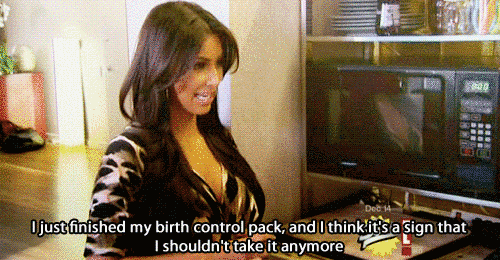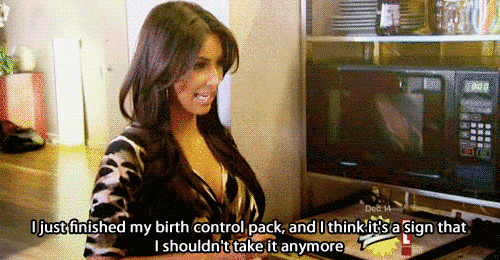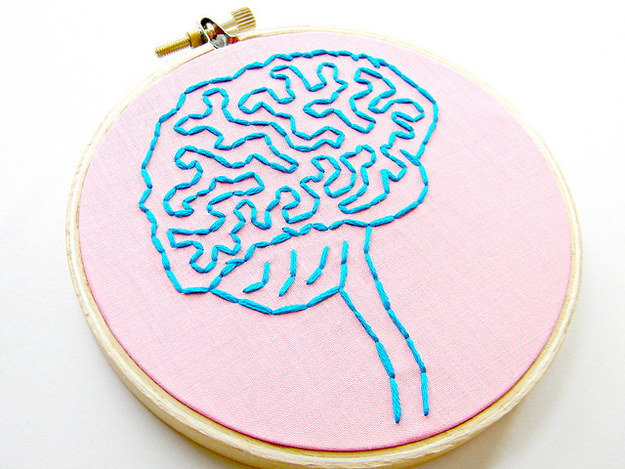Can the pill really make you crazy/anxious/bitchy/depressed?
Everyone knows someone who swears that birth control made them depressed, anxious, crazy, jealous, or just a general monster.

NBC / Via gifs-from-the-seaside-ca.tumblr.com
Or maybe you were one of those people! It’s a side effect that seems to have a lot of anecdotal support, but not much conclusive science behind it. Why do some people notice weird mood changes while on birth control and others don’t? Why might one formulation affect you more than another? And most important, how do we know it’s the birth control and not some other factor at play?
To find out more, BuzzFeed Life took a look at the research and reached out to two experts: Dr. Alyssa Dweck, board-certified OB-GYN and co-author of V is For Vagina, and Nicole Petersen, Ph.D., a neuroscientist specializing in how hormones affect brain and behavior at the Semel Institute for Neuroscience & Human Behavior at UCLA School of Medicine.
Overall, there is not strong evidence that birth control causes mood changes or mental health disorders.
There have been a lot of studies on this, but nothing has found a conclusive link between the two, Dweck tells BuzzFeed Life. In the past 15 years, there have been four major studies to look at this link. Here’s a little bit more on those:
Two of the studies were inconclusive and didn’t find any significant positive or negative mood effects from birth control. The first was a 2003 study that looked at 658 women taking birth control pills. They found that some women felt their premenstrual mood was worse on the pill while others thought it was better, and the only predictor of a worse mood was a history of depression. The next was a 2007 population-based study in Australia that looked at over 9,000 young women. They found that women taking birth control pills were no more likely to experience depressive symptoms than women not taking the pill, after adjusting for other factors. They also found that the likelihood of experiencing depressive symptoms while on the pill decreased as time went on.
The other two studies actually found positive mood effects associated with hormonal birth control. A 2011 population-based study in Finland looked at psychological effects while using birth control pills or the IUD. They found that any mental health effects were modest and mostly positive. And the most recent one was a 2013 population-based study in the U.S., which found that birth control users had lower levels of depressive symptoms on average compared to other women, and they were less likely to report a suicide attempt in the last year. They concluded that hormonal birth control may reduce depressive symptoms.
But these studies all come with limitations, and it’s possible that they’re not telling the whole story.

Pabkov / Getty Images / Via thinkstockphotos.com
One major limitation is that it’s hard to prove that any self-reported changes in mood or mental health (which are so individual and hard to pin down in the first place) are actually a result of taking hormonal birth control and not a result of a million other factors going on in each person’s life, says Dweck. Not to mention that many people already have a preconceived notion that hormonal medications may alter your mood, so that could lead to a self-fulfilling prophecy or just cause you to attribute your strange symptoms to the pill rather than something else (like that you’re severely stressed, overtired, sick, whatever).
Another issue is that people who have bad side effects on birth control may stop taking it, so the huge studies that compare people on and off birth control wouldn’t necessarily account for those who already went off of it because it made them anxious or emotional.
Or it could be that these findings show the average experience most people have on birth control, which is great and helpful for most people, but it doesn’t mean that there aren’t some outliers who might react negatively. If some people experience positive mood changes and some experience negative mood changes and some stay the same, the average finding may look like there’s no real change, says Petersen.
What the research does tell us is that for the vast majority of people, hormonal birth control is well tolerated and does not influence your mood.
For lots of people, birth control can help with heavy periods, painful cramps, horrible acne, irregular cycles, and even conditions like PCOS and endometriosis, says Dweck. And hey, an improved mood wouldn’t be too far off if you’re getting benefits like this.
Of course, that doesn’t mean that everyone will react to every medicine in the same way — just like allergy medicine might make you pass out while it makes your best friend twitchy and hyper. We’re all different.
But we also know that some people report negative mood changes, depressive symptoms, or mood swings while taking hormonal birth control, and they seem to get better when they stop taking it or switch to another method.


E! / Via gurl.com
There’s no reason to discount someone’s experience just because it doesn’t fit in with the majority. That said, it’s still hard to prove the birth control was to blame since there could be other stuff going on — like if you stopped taking this birth control method right after you finally dumped that loser you were going out with. Or it could be a placebo effect — if you think it’s the pill that’s making you feel funny, you might feel better when you stop it.
One study in the journal Psychoneuroendocrinology in 2013 tried to test this placebo effect with 34 women who previously reported feeling weird on the pill. These women were randomized to either take one cycle of birth control pills or placebos. At the end of the cycle, the women taking hormonal birth control were actually more likely to report worse mood, fatigue, and mood swings than the placebo group. It’s a small study, but it seems to show that some women do notice mood changes on the pill — even if they don’t know they’re taking it, says Petersen.
So how might hormonal birth control affect your mood or mental health?

Beyonce Vevo / Via thecatsprow.tumblr.com
The most likely explanation would have to do with hormones, says Dweck. Many people notice mood changes throughout their natural menstrual cycle, so it’s possible that regulating your cycle with hormonal birth control can keep those mood swings to a minimum. But others may be very sensitive to the way these hormones interact with their body, which might have a negative effect on their mood, says Petersen.
Some research also suggests that a history of depression or other mental health issues could make you more likely to report mood changes on the pill. It’s possible that some people may find their depressive or anxious symptoms exacerbated on birth control, says Dweck. Unfortunately, we just don’t know. “Maybe it’s one risk factor or maybe it’s the interaction between one risk factor and one certain type of pill,” says Petersen.
Or it might have to do with something going on in your brain.

Hey Paul Studios / Creative Commons / Via Flickr: hey__paul
Petersen and her colleagues have studied brain structure and found that being on hormonal birth control was associated with lower cortical thickness in the lateral orbitofrontal cortex (part of the prefrontal cortex, which is involved in decision making) and the posterior cingulate cortex (involved in your brain’s default/rest mode). In another study they found decreased amygdala activity (the part of the brain involved in emotion and the intensity of memories) in women taking birth control.
IMPORTANT: This does NOT mean that birth control is ruining your brain. Petersen strongly emphasizes that her team was studying brain structure, not brain functioning or behavior, so they’ve made no assumptions about birth control based on their research. “We’re not saying it makes [the brain] better or worse,” she says. “We couldn’t say it was positive or negative based on this data.” They haven’t found evidence that birth control actually affects how your mind works — just how it looks in functional imaging.
ALL THAT SAID, if you are experiencing new mood changes or mental health disturbances while taking hormonal birth control, talk to your doctor.
Based on what doctors and researchers know, it’s probably not your birth control. It’s more likely to be some other random factor: like that you’re stressed, not getting enough sleep, starting a new job, starting a new relationship, ending a relationship, having a really shitty week, or just noticing symptoms of a mental health issue that would have happened whether you went on birth control or not (the average age of onset for mood disorders is typically in your late teens, twenties, or early thirties).
That said, it’s important to get help regardless of the cause. So if the first stop is your gyno’s office, great! Just make sure to be open and honest with your doctor if there could be another possible factor at play. They may suggest a different birth control method, dose, or formulation if it truly sounds like it’s to blame. If that doesn’t help, it’s worth asking for a referral to another doctor or therapist who might be able to help suss out any other possible causes. “I think people know their bodies, so if there are any concerns, bring it up to your physician,” says Dweck.

















